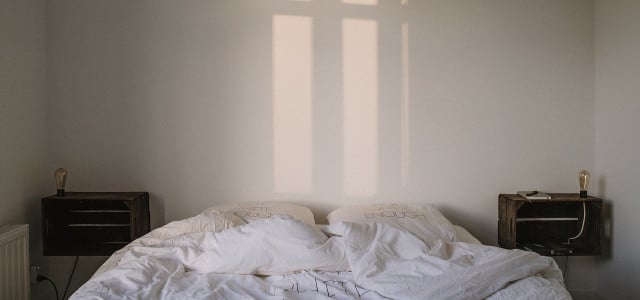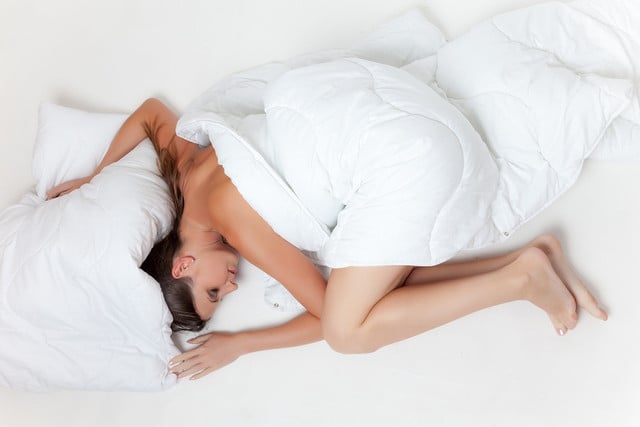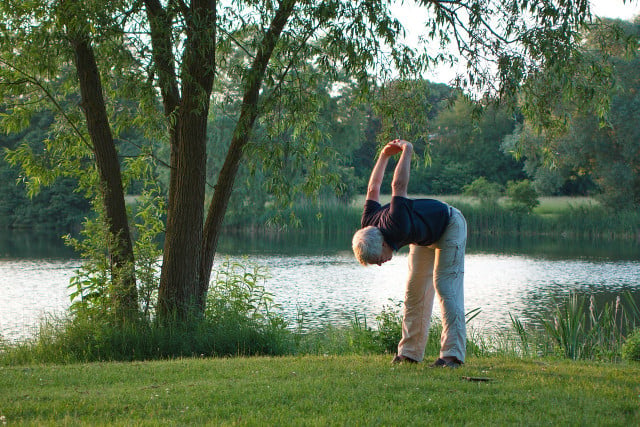
Neck pain after sleeping can have many causes. Here you can read how you can avoid them and when you should seek medical advice.
We actually want to wake up refreshed in the morning – but sometimes when we get up our neck hurts and every movement hurts. A tense neck like this can be annoying and painful for the rest of the day. The causes are manifold.
There are several habits you can change to avoid neck pain after sleeping.
This is why your neck can hurt after sleeping
When sleeping, people tend to stay in the same position for a long time. Muscles, tendons and nerves therefore do not move as much as during the day. According to the Orthopedic Joint Clinic Gundelfingen, this reduced movement can lead to neck pain after sleeping.
In addition to the loss of movement, the wrong pillow, the wrong mattress or the wrong sleeping position can also play a decisive role.
Other reasons for a tense neck in the morning can also be cold temperatures in the bedroom or drafts coming in through an open window. The neck can also become tense as a result of grinding your teeth at night, as this causes the upper and lower jaws to press together under high pressure.
The right pillow

(Photo: CC0 / Pixabay / DieterRobbins)
If you keep waking up in the morning with neck pain, it may make sense to do something about the possible triggers mentioned above. You may find it helpful to replace the pillow. Participants in a Korean study may sleep worse if they lie on a large pillow. Accordingly, a functional pillow is more suitable for improving neck pain after sleeping and recovery. According to the scientists, the functional pillows should be tailored to the sleeping position and complaints.
As Bernd Kladny, Secretary General of the German Society for Orthopedics and Trauma Surgery (DGOU), described to the German Press Agency (dpa), sleeping position and the size of the pillow are closely linked. “It is important, especially for stomach and back sleepers, that only their head lies on the pillow,” says Kladny. Therefore, pillows measuring 80 by 80 centimeters are not so suitable. According to the orthopedist, it is not necessary to differentiate between stomach and side sleeper pillows because people often change their sleeping position at night. However, according to Kladny, anyone who has back or neck problems should seek advice on pillows.
Peter Young, chairman of the German Society for Sleep Research and Sleep Medicine (DGSM), explained to the dpa: The most important thing when choosing a pillow is that it enables pain-free sleep, does not force a posture and subjectively feels good.
Neck pain after sleeping: This can also help

(Photo: CC0 / Pixabay / StockSnap)
If you’re struggling with neck pain after sleeping, you can either change your pillow or leave it out completely. You can also change the other triggers for the pain:
- For example, get advice from a mattress specialist store about which mattress is best for your body type and weight.
- The sleeping position can also cause neck pain after sleeping. Try it out to find a position that is comfortable for you. Experts recommend lying on your back with your legs stretched out for pain-free sleep. It represents a neutral position and offers a balance to all the sitting in everyday life. An alternative to this is sleeping on your stomach, where you turn your head to the side. However, if you are only a side sleeper, some experts recommend a thicker pillow that closes the gap between your head and the mattress. It is not recommended to sleep on your back during pregnancy. This could have a negative effect on the embryo’s movements and heartbeats. The best position for pregnant women is lying on their side.
- To prevent cool room temperatures and drafts from causing neck pain after sleeping, you should close the windows.
- Dentists can usually tell whether you grind your teeth by looking at your teeth. In most cases, you will then receive a bite splint that protects your teeth and cushions the pressure caused by the jaw clenching. You can also try doing relaxing exercises to stretch the muscles of your neck, face, shoulders, and back to relieve everyday stress.
Exercises for neck pain after sleeping

(Photo: CC0 / Pixabay / cnort)
If you woke up with neck pain after sleeping, you can do various neck and shoulder exercises to relieve the pain. The Joint Clinic recommends the following movements to loosen the neck muscles:
Shoulder circles:
- Stand or sit upright and let your arms hang loosely.
- Let one shoulder circle back. Focus on moving backwards and downwards.
- Perform 10 to 15 reps and then turn to the other shoulder.
- Repeat the movement about two to three times for each shoulder.
Pull shoulders up and down:
- Stand or sit upright again and let your arms hang loosely.
- Pull both shoulders towards your ears and breathe in.
- Pull your shoulders down and breathe out.
- Do this exercise 10 to 15 times, then take a 60 second break and repeat the exercise two to three more times.
Stretching the upper back muscles:
- Stand or sit upright.
- Extend your arms forward, clasp your hands together and lower your chin to your chest.
- Pull your hands forward. You should feel a pleasant stretch in your neck. Hold this stretch for 30 seconds.
- Lower your arms, completely release the tension and feel for 30 seconds; repeat the exercise two to three times.
Stretching the chest muscles:
- Stand next to a wall and lean your forearm against it. This creates a 90 degree angle between your upper and lower arm and a 90 degree angle between your upper arm and your upper body.
- Now slowly turn away from the wall until you feel a pleasant stretch in your chest muscles. Hold this stretch for 30 seconds.
- Release the pose, release all tension for another 30 seconds and repeat the exercise two to three times.
Then you should seek medical advice
Most of the time, you can avoid a stiff neck or neck pain after sleeping through simple behavior and habit changes or reduce it with exercise.
In certain cases, however, you should seek medical advice. The Klinik am Ring in Cologne summarizes when this can make sense. If you have very severe neck pain after an accident or other injury, you should definitely have your neck examined. The same applies if the pain radiates to the shoulder, shoulder blade or arm. You should also seek medical attention if any part of your body feels numb or tingling after sleeping or if you notice a reduced sense of touch.
Read more on Techzle\.com:
- Cell phone neck: These 6 tips will help
- Relieve tension: This is how you get rid of pain in your shoulders, neck and back
- Fascia ball: How to use it correctly